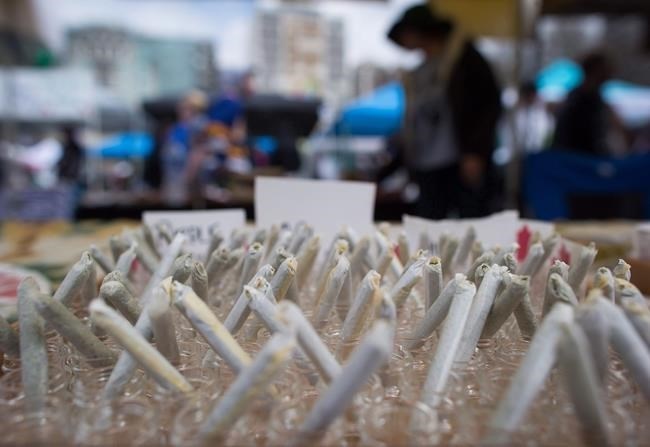
Joints are displayed for sale during the annual 4-20 cannabis culture celebration at Sunset Beach in Vancouver, B.C., on Thursday, April 20, 2017. The Trudeau government is willing to give provinces and territories a bigger share of the revenue from a federal excise tax on cannabis, provided that the extra money is devoted to helping municipalities cope with the impact of legalizing recreational pot.
Image Credit: THE CANADIAN PRESS/Darryl Dyck
December 04, 2017 - 9:00 PM
OTTAWA - The Trudeau government is willing to give provinces and territories a bigger share of the revenue from a federal excise tax on cannabis, provided that the extra money is devoted to helping municipalities cope with the impact of legalizing recreational pot.
The feds have proposed giving provincial and territorial governments half of the estimated $1-billion annual excise tax take once weed becomes legal next July.
But The Canadian Press has learned that Finance Minister Bill Morneau and his officials have signalled a willingness to increase that share during discussions with their provincial and territorial counterparts.
The discussions have been taking place in preparation for a meeting of federal, provincial and territorial finance ministers Dec. 10-11, where the issue of cannabis taxation is expected to be front and centre.
Any increase in the provincial share will obviously mean less for federal coffers. But precisely how much less than 50 per cent the federal government is willing to accept has not yet been revealed.
A government official close to the discussions, who was not authorized to speak publicly about the matter, said it's too early to float specific numbers. The final decision will rest on an assessment of the needs of the municipalities — and a willingness by provinces and territories to agree to devote the extra revenue to those needs, the official said.
Ontario Finance Minister Charles Sousa agreed that municipalities need to be recompensed for costs associated with marijuana legalization.
"I've always said all along that the municipalities and the province need to get a proper share to cover those costs," he said Monday.
"We have a lot of out-of-pocket (expenses) right at the start ... That needs to be recovered. So we will work closely, we want to make sure that municipalities are covered as well."
However, before agreeing to anything, Sousa said he needs to see a breakdown of the costs that are going to be incurred and how much of those costs the federal government is prepared to assume. He said he expects to hear more on that front at the finance ministers' meeting next week.
Mike Farnworth, British Columbia's public safety minister and solicitor general, was encouraged that the feds appear to have heard complaints that a 50 per cent share of the tax revenue is insufficient for provinces, which along with municipalities will bear most of the cost.
"The news that Ottawa is starting to move in the direction where the provinces want to go, I think is positive," said Farnworth.
Similarly, Newfoundland and Labrador's finance minister, Tom Osborne, called the news "a step in the right direction."
But Alberta Finance Minister Joe Ceci declined to comment until he hears a new offer "from the minister's mouth."
"The original offer was 50-50 and they were told clearly that that's not on," Ceci added.
"So we need to get in a room with each other so we can talk about what that offer really is, and nothing short of the majority of the money (going to the provinces) is OK."
Mayors across the country have raised concerns about the potential cost to municipalities.
Jenny Gerbasi, president of the Federation of Canadian Municipalities, welcomed the news that municipal needs are being taken into account.
"Local governments are on the front lines of legalizing recreational cannabis, and we're doing what we can to get ready," she said. "Growing our operational and enforcement capacity is a big job with big costs."
The federal government is sympathetic to the concerns of municipalities, the official said.
Under the current proposal, the federal government would impose an excise tax of $1 per gram of marijuana or 10 per cent of the final retail price, whichever is higher, with half the revenue going to provinces and territories.
Federal and provincial sales taxes would be applied on top of that.
A one-month public consultation period on the excise tax proposal closes on Dec. 7, just ahead of the finance ministers' meeting.
Premiers have been complaining since early October, when Prime Minister Justin Trudeau first unveiled the excise tax plan, that a 50-50 revenue split with Ottawa is not good enough. They maintain their governments will shoulder the lion's share of the cost of legalization — including public education, policing and road safety — and should, therefore, get the lion's share of the tax revenue.
Co-ordinating cannabis taxation with the provinces is crucial to the federal objective of drumming organized crime and gangs out of the illegal pot business and keeping marijuana out of the hands of minors. If the price of legal marijuana is not competitive, the black market will continue to flourish.
Under the federal proposal, sales and excise taxes would be levied on both fresh and dried marijuana, pot-infused oils and seeds and seedlings used for home cultivation.
They would also be applied to medical marijuana, on which only HST is currently levied. That proposal has drawn fire but the government argues it's necessary to ensure there's no incentive for people to seek out medical pot just because it's cheaper.
The final price tag for legal weed will vary across the country because provinces have different sales taxes.
— With files from Allison Jones in Toronto; Dirk Meissner in Victoria; Dean Bennett in Edmonton; and Sue Bailey in St. John's.
News from © The Canadian Press, 2017